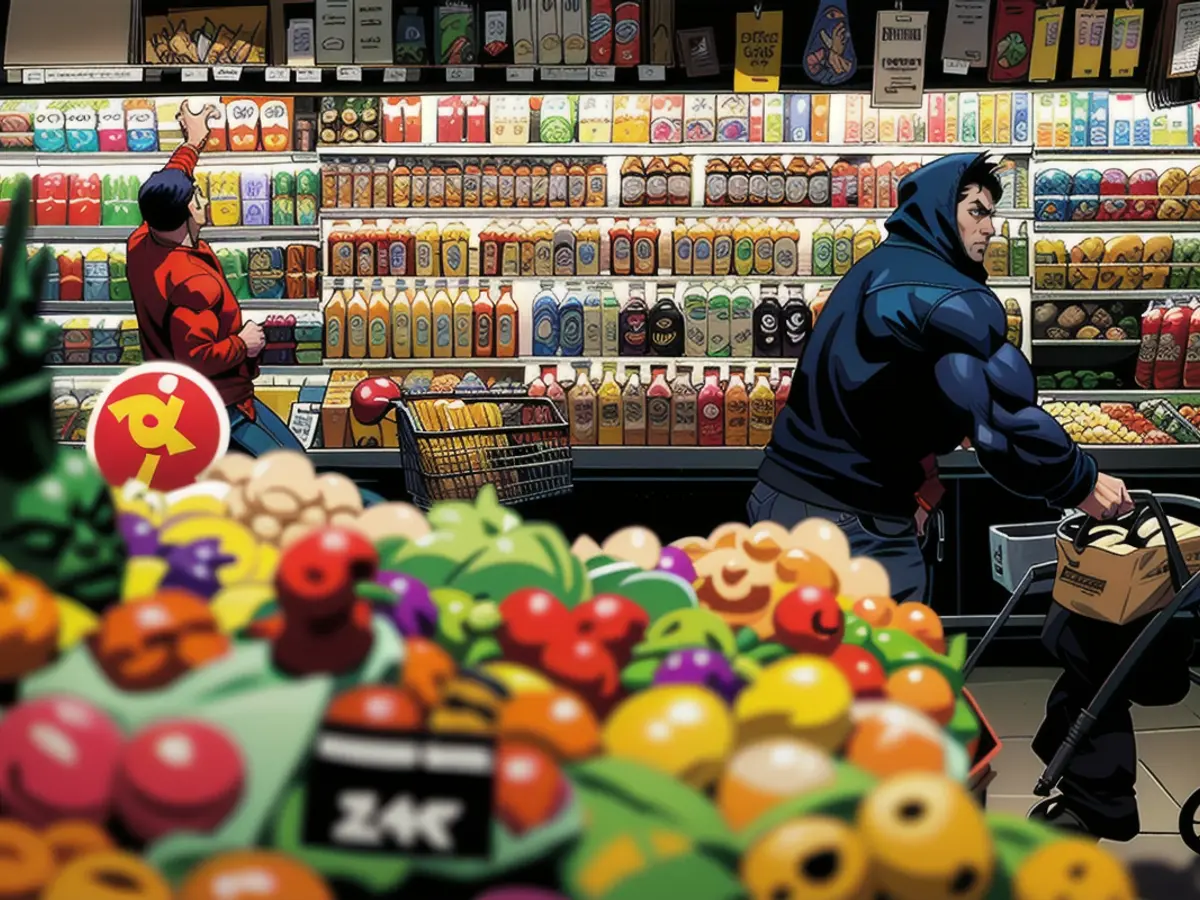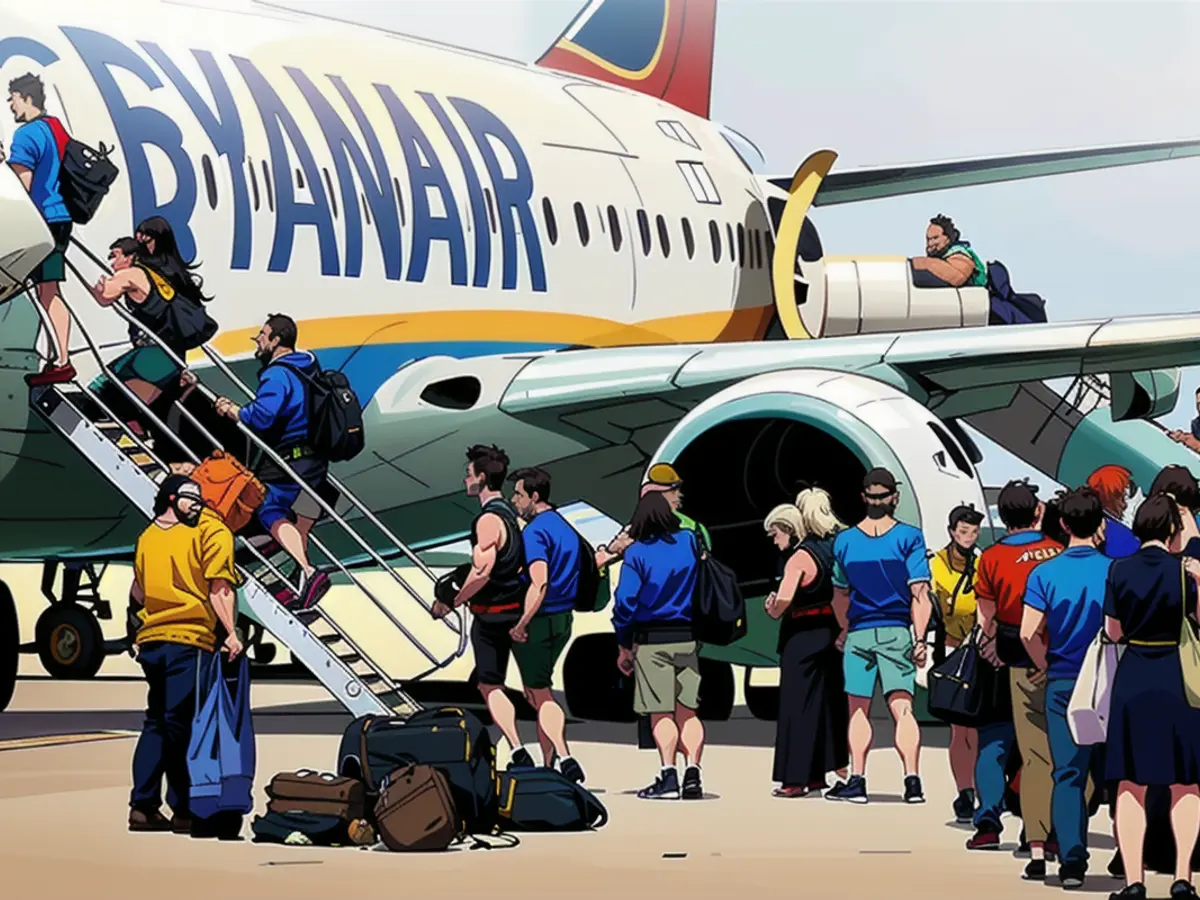Economic experts are concerned about the future as Americans have depleted their financial reserves.
A version of this story first appeared in CNN Business's Before the Bell newsletter. Sign up here to subscribe. You can listen to an audio version of the newsletter through that same link.
The appeal of that little extra cash cushion during the pandemic led to continued consumer spending even as interest rates rose and inflation persisted. However, with that extra money now depleted, economists are uncertain about the future consequences.
The most current predictions of pandemic-induced oversavings in the US economy have become negative, as stated by Hamza Abdelrahman and Luiz Edgard Oliveira, economists at the San Francisco Federal Reserve. This signifies that multiple Americans have more debt than savings. In their recent report, they concluded that "American households fully spent their pandemic-era savings as of March 2024."
Consumer spending significantly impacts economic growth in the United States, and recently, it has demonstrated impressive resilience. This is now in question as the overflow savings has now depleted to zero.
The alarming development is the ensuing increase in debt. Even though consumer debt levels are not yet excessively high, the Federal Reserve is concerned about the rising rate of consumer delinquencies, or overdue payments on bills like vehicle loans, credit cards, and rent.
"If the delinquency rate of consumer loans starts rising, that's often a leading indicator for, 'things are about to get worse,'" said Chicago Federal Reserve President Austan Goolsbee at a Society for Advancing Business Editing and Writing panel last month.
In the first quarter of the year, real GDP—a general measure of the US economy—increased by only 1.6% annualized, falling significantly under economist expectations. Predictions for growth this year are already being lowered.
Fitch Ratings, for example, anticipates that growth will slow to a significantly below-average rate later in the year.
Retailers are also becoming distressed.
For more than a year, consumers have stepped back on shopping, leading several retailers to decrease prices in order to lure shoppers and persuade them to spend money on things such as clothing, household decor, or crafting and hobby kits. Shoppers have been impacted by increasing costs and stagnant wages.
Alarming drops in the shares of Tyson Foods and Starbucks occurred after each reported declining consumer spending due to cost pressures and reluctance to maintain previous spending patterns. Similarly, McDonald's CEO Chris Kempczinski admitted in a recent earnings call that consumers are becoming more frugal and stringent with their finances.
There may be a silver lining: Abdelrahman and Oliveira pointed out that while excess savings accumulated in 2020 and 2021 did play a role in bolstering the economy, it was "only one of many possible factors that helped consumers maintain robust spending levels."
The US labor market, with its historically low unemployment rate, remains strong, which might enable households to maintain spending patterns similar to those observed recently, despite the lack of pandemic-era savings.
Companies like Disney, Airbnb, Uber, Anheuser-Busch, Tapestry, and Dillards will report their financial results later this week. Investors will closely monitor any comments on how consumer spending, or lack thereof, will affect revenue forecasts for 2024.
Meanwhile, billionaire Warren Buffett, chairman, CEO, and co-founder of Berkshire Hathaway, has expressed concern about artificial intelligence. During his annual shareholder meeting in Omaha, Nebraska, Buffett warned that AI could potentially pose problems, likening it to nuclear weapons.
"We let a genie out of the bottle when we developed nuclear weapons," he said on Saturday. "AI is somewhat similar - it's partway out of the bottle."
Buffett, who acknowledges having little understanding of AI technology, emphasized its potential dangers. His image and voice have been convincingly replicated by AI, he shared, leading to the possibility of widespread scams using these deep fakes.
"If I were interested in investing in scamming, it's going to be the growth industry of all time," he said to his audience.
Berkshire Hathaway has already started employing AI to make its employees more productive, confirmed Greg Abel, the individual expected to succeed Buffett and run Berkshire's non-insurance operations. However, they did not provide any details on how the company intends to utilize AI.
Warren Buffett recognized the immense potential of AI to revolutionize various sectors, including healthcare, finance, and even music. However, he confessed that he isn't completely convinced about its impact yet. "AI possesses immense potential for good and immense potential for harm," he stated, expressing uncertainty about how it might unfold.
AI has already wrought significant changes in workplaces globally, with an estimated 40% of global employment susceptible to disruption due to AI, according to the International Monetary Fund. Booming industries like medicine, finance, and music have already experienced its influence.
As a result, shares for companies heavily involved with AI have skyrocketed. For instance, Nvidia's stock has appreciatively surged by around 215% during the past year, and Microsoft has experienced a 34% surge as well. Berkshire Hathaway's shares have also increased by approximately 22% in the same duration.
FAA Launches New Investigation into Boeing: Concerns Surround 787 Dreamliner Inspections
The Federal Aviation Administration (FAA) announced on Monday that it was initiating a fresh inquiry into Boeing, focusing this time on potential quality inspection omissions related to their 787 Dreamliner aircraft.
The FAA's investigation aims to ascertain whether the inspections transpired and whether Boeing employees deceitfully manipulated aircraft records.
During this query, Boeing employees will pore over Dreamliners still unreleased to airline clients and design a plan for the planes that are already airborne, according to the FAA.
In early April, the FAA was informed by Boeing that they may not have completed essential inspections checking if there was adequate bonding and grounding where the Dreamliner's wings and fuselage interconnect.
The director of the 787 program at Boeing, Scott Stocker, disclosed in an internal memo shared with CNN that the concern was reported by an employee and identified as a case of "misconduct." Despite ascribing it as a "non-immediate safety of flight issue," he emphasized the swift and serious actions the company swiftly took to address the situation.
Read also:
- Lack of snow also opens up new opportunities for winter tourism
- Abrupt end to e-car subsidies
- The chemical industry has little confidence
- Intersport boss hopes for sales boom through sporting events
Source: edition.cnn.com







